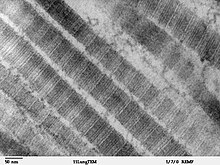Nanometer ruler
Nanometer Rulers ( English Nanoruler ) are used in microscopy to the achievable resolution of a particular microscope (is usually in the mid-nanometer range) to review and estimate the size of observed structures in preparations.
principle
Nanometer rulers can be generated by various methods, e.g. B. quantum dots , colloidal gold or DNA origami . In DNA origami, a DNA structure forms the basic structure of the nanometer ruler , to which fluorescent dye molecules can be attached , which act as the “marking lines” of the ruler. As with all DNA origami structures, the manufacturing process is carried out by self-assembly , so that a single batch (approx. 100 µl) can contain up to 10 11 nanometer rulers. Usually, the finished nanometer rulers are immobilized on a cover glass immediately after production and this is then sealed, so that the ruler can be used for a few months.
In transmission electron microscopy , collagen fibers are used as nanometer rulers, some of which occur naturally in the preparation. Colloidal gold or tungsten particles of various sizes (five or ten nanometers) are also used.
In the surface plasmon resonance colloidal be silver - or gold particles.
literature
- EA Jares-Erijman, TM Jovin: Imaging molecular interactions in living cells by FRET microscopy. In: Current Opinion in Chemical Biology. Volume 10, Number 5, October 2006, ISSN 1367-5931 , pp. 409-416, doi : 10.1016 / j.cbpa.2006.08.021 , PMID 16949332 .
Individual evidence
- ↑ a b J. J. Schmied, M. Raab, C. Forthmann, E. Pibiri, B. Wünsch, T. Dammeyer, P. Tinnefeld: DNA origami-based standards for quantitative fluorescence microscopy. In: Nature Protocols . Volume 9, number 6, June 2014, ISSN 1750-2799 , pp. 1367-1391, doi : 10.1038 / nprot.2014.079 , PMID 24833175 .
- ^ A. Agrawal, R. Deo, GD Wang, MD Wang, S. Nie: Nanometer-scale mapping and single-molecule detection with color-coded nanoparticle probes. In: Proceedings of the National Academy of Sciences of the United States of America . Volume 105, number 9, March 2008, ISSN 1091-6490 , pp. 3298-3303, doi : 10.1073 / pnas.0712351105 , PMID 18305159 , PMC 2265145 (free full text).
- ↑ Y. Chen, MB O'Donoghue, YF Huang, H. Kang, JA Phillips, X. Chen, MC Estevez, CJ Yang, W. Tan: A surface energy transfer nanoruler for measuring binding site distances on live cell surfaces. In: Journal of the American Chemical Society . Volume 132, number 46, November 2010, ISSN 1520-5126 , pp. 16559-16570, doi : 10.1021 / ja106360v , PMID 21038856 , PMC 3059229 (free full text).
- ^ S. Beater, M. Raab, P. Tinnefeld: Toward quantitative fluorescence microscopy with DNA origami nanorulers. In: Methods in cell biology. Volume 123, 2014, ISSN 0091-679X , pp. 449-466, doi : 10.1016 / B978-0-12-420138-5.00024-0 , PMID 24974042 .
- ↑ C. Steinhauer, R. Jungmann, TL Sobey, FC Simmel, P. Tinnefeld: DNA origami as a nanoscopic ruler for super-resolution microscopy. In: Angewandte Chemie (International ed. In English). Volume 48, number 47, 2009, ISSN 1521-3773 , pp. 8870-8873, doi : 10.1002 / anie.200903308 , PMID 19830751 .
- ^ JJ Schmied, M. Raab, C. Forthmann, E. Pibiri, B. Wünsch, T. Dammeyer, P. Tinnefeld: DNA origami-based standards for quantitative fluorescence microscopy. In: Nature protocols. Volume 9, number 6, June 2014, ISSN 1750-2799 , pp. 1367-1391, doi : 10.1038 / nprot.2014.079 , PMID 24833175 .
- ↑ PD Nallathamby, T. Huang, XH Xu: Design and characterization of optical nanorulers of single nanoparticles using optical microscopy and spectroscopy. In: Nanoscale. Volume 2, number 9, September 2010, ISSN 2040-3372 , pp. 1715-1722, doi : 10.1039 / c0nr00303d , PMID 20820702 , PMC 2946254 (free full text).
- ^ RT Hill, JJ Mock, A. Hucknall, SD Wolter, NM Jokerst, DR Smith, A. Chilkoti: Plasmon ruler with angstrom length resolution. In: ACS Nano . Volume 6, number 10, October 2012, ISSN 1936-086X , pp. 9237-9246, doi : 10.1021 / nn3035809 , PMID 22966857 , PMC 3525076 (free full text).
